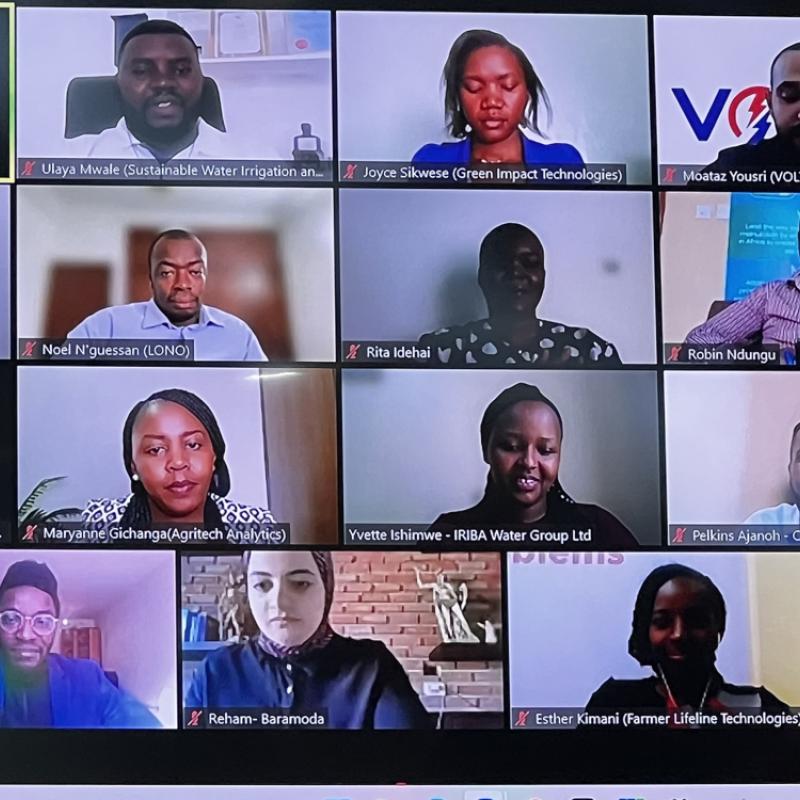
AAAP in the Media
Displaying 1 - 5 of 5
20 young African entrepreneurs bag $100,000 each to boost their climate adaptation businesses
Digital Climate Adaptation Solutions Training – Southern Africa
Harnessing the power of technological innovations and digitalization to improve agricultural productivity and strengthen climate resilience has been recognized as one of the potential game changers to address many of pressing climate concerns and rural transformation challenges facing Africa today.
Digital climate-informed advisory services are tools and platforms that integrate climate information into agricultural decision-making. These services range from digital mobile apps, radio, and online platforms to digitally enabled printed bulletins based on climate models and extension services that utilize climate information platforms. DCAS offers crucial opportunities to build the resilience of small-scale producers in the face of worsening climate change impacts, particularly when bundled with complementary services (such as financing, input supply, market access, insurance).
The objectives of the DCAS trainings are as follows:
- Capacity enhancement for agricultural stakeholders across Southern Africa in DCAS
- Supporting trainees to improve their confidence and capacity to design and implement DCAS projects to reach the last mile and farmers for improved food security and climate resilience
- Facilitating knowledge/experience sharing of participants on contextual issues and approaches to scale up DCAS
- Increase the knowledge of stakeholders from across Southern Africa on opportunities and new approaches for the design, mainstreaming and use of digital tools and data-enabled agriculture to combat the effects of climate change
- enhancing capacity to use digital agriculture advisory services and solutions to ensure uptake by of DCAS among stakeholders in Southern Africa
- Over 50 Participants trained in digital agriculture and digital climate adaptation solutions
- A new cohort or platform of African public officials, researchers, farmers organizations leaders and agricultural NGO focal points with improved expertise in DCAS (for subsequent experience capitalization follow up and training)
- Training evaluation assessment report
- Improved understanding / knowledge of target stakeholders in Southern Africa through training and information sharing including lessons learned on the challenges, opportunities and new approaches to the design, mainstreaming and use of DCAS and data-enabled agriculture
- Enhanced capacity of selected agricultural stakeholders in public institutions and farmers groups across Southern Africa to use digital agriculture advisory solutions, implement digital climate smart advisory solutions, and train their members/colleagues to use DCAS tools
€100,000
Joyce sikwese: 2022 african youthadapt challenge winner
Programme for Integrated Development and Adaptation to Climate Change in the Zambezi River Basin (PIDACC Zambezi)
Zambezi River Basin, in Southern Africa Region, has the largest drainage basin (1.4 million km2) with rich variety of natural resources, covering parts of eight riparian states namely Angola, Botswana, Malawi, Mozambique, Namibia, Tanzania, Zambia, and Zimbabwe. Despite this potential, riparian states are struggling to cope up with worsening ecological circumstances, environmental degradation, global warming, and climate change, which have created conditions of chronic vulnerability, food insecurity, and economic hardships
The objective of the project is to strengthen regional cooperation in building the resilience of the Zambezi River Basin communities to climatic and economic shocks, through promoting inclusive, transformative investments, job-creation, and ecosystem-based solutions.
- Identified climatic risks to major agricultural value chains and digital technologies that have the potential to accelerate climate adaptation in the Zambezi River Basin
- Prepared national profiles on digital adaptation in agriculture for the various countries of the Zambezi River Basin, a summary of the prevalent adaptation techniques among smallholder farmers, and the key institutional, policy and human capital challenges to digitization
- Actionable design and engagement opportunities, which will mainstream digital climate advisory services into the implementation of the PIDACC program
- Benefit about 800,000 (60% women and 10% youth) within hotspot areas, and indirectly the whole population
- Improved access to water, climate smart agricultural technologies, and community-level infrastructure for irrigation and markets
- Associated benefits include multi-sectoral utilization of shared water resources within the context of integrated land and water resources development and management, gender equality and social inclusion
- Strengthened institutional capacities and mechanisms for coordination of Basin monitoring, planning, and management
- Increased demand-driven community-level feasible climate resilient infrastructure that would support livelihoods
- Reinforced inclusive and diversified climate resilient livelihoods support through enhanced agribusiness and small & medium enterprises (SME) development
- Developed and improved livelihoods, including job creation by enhancing agribusiness through investments in water, sanitation, energy, human capital, and agriculture sectors
- Support adaptive capacity of communities with a view to avoid, reduce and reverse land degradation and effectively manage water
AfDB Investment of USD16.7 million of total USD19.4 Million
Country Digital Agriculture and Adaptation Profile: Benin, DRC, Malawi and Tanzania
Food production in Africa is largely dominated by smallholder rain-fed agriculture and the sector is therefore particularly vulnerable to climate change and variability. The continent is already experiencing more frequent extreme weather events and higher-than-average temperature increases. According to a recent report by the Global Center on Adaptation (GCA), the annual cost of adaptation actions is estimated at US$15 billion, while that of non-action is estimated at US$201 billion.
Digitalization offers the opportunity to help farmers adapt to some of the challenges arising from climate change and could lead to in-depth transformation of the agriculture sector. However, the dissemination of digital technology at the farm level risks widening the digital divide that exists for women and marginalized communities. Further, despite the rapid growth of digital technologies on the continent, youth potential as an asset to foster uptake and scale of digital agriculture is not fully exploited. However, in developing countries where wages are lower and farms generally smaller, digital technologies could help to improve management practices and access to markets.
The overall goal is to create a Digital Agriculture and Adaptation Profile (DAP) for the four countries. The study will respond to the question of how digital climate and advisory services (DCAS) can be mainstreamed in implementing the adaptation options and pathways in the National Adaptation Plan, and for the agricultural sector of selected countries. A gender lens will be applied to the studies.
Specifically, the work will include:
- Overview of the agricultural economy of the country, the main value chains, and key challenges facing each of the value chains.
- Analysis of climate vulnerability of major agricultural value chains.
- Evaluation of the landscape of digital agriculture/adaptation (infrastructure, tools, enabling environment, institutions, policies, services).
- Mapping of existing and promising initiatives related to DCAS in the country.
- Identifying key players (public, private, non-profit, international community) across value chains, in digital agriculture and DCAS in the country as well as their roles and solutions.
- Assessing the challenges, barriers and opportunities to the investment, adoption and scaling of DCAS.
- Developing a business case for DAP in relation to investment operations.
- Identifying and prioritizing promising digital climate adaptation solutions that are applicable to help producers in adapting to climate change and in building better resilience across value chains.
- Through the DAP, an assessment of the readiness of the four countries for digital agriculture.
- A holistic review of digital transformation articulated around six topics: the extent of climate challenges and adaptation potentials, digital infrastructure, digital penetration, policy and regulation, business environment, human capital and agro-innovation.
- An opportunity for investment banks to make informed decisions in the planning of ongoing and future projects.
- Developing a DAP can help to identify how to best harness the digital-agriculture-adaptation nexus to facilitate decision-making.
- The results will be used by countries and their partners in implementing DCAS (short-, medium- and long-term investments).
- In supporting the development of DAP, GCA is working with partners to plug the gaps in the information needed to provide contextual understanding of background issues, and to ensure that investments in climate adaptation projects are designed and founded on sound and robust information that provide adequate context of focal/selected countries.
Technical Assistance

